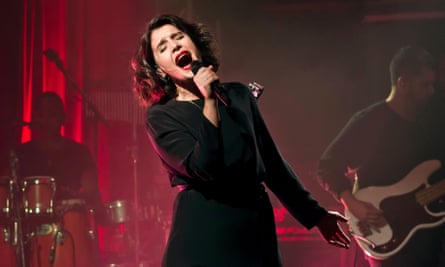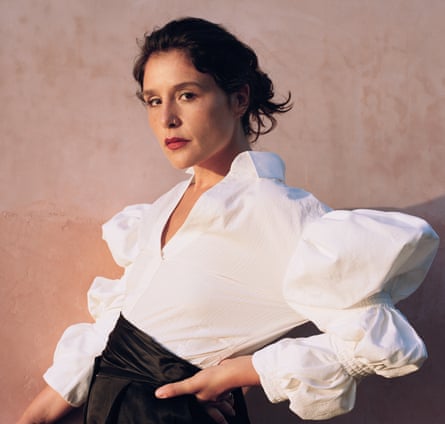“Are you sure I don’t sound mad and unhinged?” Jessie Ware asks, again. We have spent two hours discussing hypnotherapy, impostor syndrome and her fears about failing as a mother as she tours her third album, Glasshouse, with her one-year-old in tow. No, I tell her. She sounds like a new mum who apologises too much because people like to make new mums feel they’re failing. Babies cry, that’s what they do – her daughter was meant to be asleep in their Berlin Airbnb all afternoon, but did a giant poo and woke up as we were about to start talking. “We’re buggered!” Ware laughs, before husband Sam Burrows takes the tot to the park.
Tonight, Ware will play a small club in Kreuzberg, debuting an ambitious, poppy revamp of her sophisticated soul sound. She wants to wear a sleeveless top but it’s being filmed for German TV: “Bingo wings, fuck that.” She’s nervous. Last night in Paris she had a massive cry, finally unleashing the pressure of spending nearly two years managing a career and new parenthood. “I felt like maybe this whole attempt at trying to be a superwoman was coming crashing down at the last hurdle,” she says.
Then there was our negative review of a recent London concert: “Caught between candour and blandness” read the headline. She considered it hostile, but confesses that “maybe it rang a bit too true. I think I’ve not been able to enjoy myself onstage because I’m a control freak, anxious and thinking about 6,000 things at once.” Her fears prompted her to get hypnotherapy, “cos I feel like I’m being quite anxious on stage. I can do better, and I don’t know what’s happened,” she says sadly. “I don’t know whether it’s losing a bit of confidence from being away for a while, or whether it’s always been there and I’ve never really addressed it.” The therapist asked what she thinks during shows. “Don’t fuck up, cos if you fuck up people aren’t gonna wanna listen to your music, then they won’t come to your tour, then you’re not gonna have a job,” she rattles off. “He’s like: ‘I think you need a few more sessions!’”

Anxiety aside, Ware in person is as bolshy as she’s ever been. Having a baby has made her “fiercely ambitious”. She was determined to prove to herself, “and to all the males in music, that make you think having a baby is a weakness, that I can do it. And then I’m bloody crying in some shithole backstage place in Paris”.
After the gig, she cried again. But these were good tears – triggered by a mum and daughter holding each other while she sang Sam, Glasshouse’s last song, which shows off her newfound ambition. While it bears traces of co-writer Ed Sheeran’s slightly saccharine sound, the raw lyrics are miles from anything on his one-dimensional Divide, or indeed Ware’s earlier records. Addressing her mother, she sings: “I hope she knows I’ve found a man far from my father: Sam, my baby and me.” She and Sheeran finished the song when Ware was eight months pregnant. “He could see that I was ready to pop, and so he was like: ‘Let’s go there,’” she says. “The father line, he definitely pushed. I said, I don’t know, am I pissing my father off? He said, if it feels uncomfortable, maybe you should be doing it. And so I went for it.”
Ware says the song isn’t really about her father, it’s about her on the cusp of motherhood, though she still wouldn’t let John Ware, a former Panorama journalist, see her London shows. She was nine when he left. “And it was quite a public thing, the fucking Daily Mail doorstepped us,” she says. “It was really horrible, actually.” They didn’t speak until her mid-teens. She also studied to be a journalist, which sounds like a way of trying to be close to him despite their issues. “I think I was really impressed by him,” she agrees. Although she says she was equally inspired by her mum’s career as a social worker. “Both of them are so passionate about their jobs, I wanted to feel that.”
But it’s hard to tell how much Ware ever wanted to be a singer. It was only ever a hobby until friend Jack Peñate asked her to provide backing vocals for him live. Another friend suggested she collaborate with a rising, unsigned producer called SBTRKT. The song was released on hip Glasgow label Numbers in 2010, and pushed both acts into a tastemaker embrace. That’s the other part of the Guardian’s review that stung, she says: suggestions that she has had an easy ride, which she worries she has invited. “I didn’t show how appreciative or bewildered I was. It hasn’t been easy,” she says emphatically. She adds that nobody gets to their third record “with just luck”.
Ware agrees that she let the producers on her 2012 debut Devotion use her like a canvas, hiding her fluttery voice inside edgy production. “I wasn’t ready because I didn’t know who I was,” she says. “It takes a long time.” She admits that she didn’t like herself during her 20s, but touring Devotion for two years made her realise other people did, so she started chatting garrulously to crowds as a coping mechanism. She has become friends with London mayor Sadiq Khan, who tells me of Ware’s “amazing stage presence and unique voice, which you can only fully appreciate when you see her live”.
On 2014’s Tough Love, collaborators Benny Blanco and Two Inch Punch wanted her to strip back the reverb. “I still wasn’t ready,” she says. “I was so rude – I was like: ‘That’s too Katy Perry.’” She slams the table and hoots. “Like that’s a bad thing! ‘Oh no, you’ve just written a hit, oh shit!’ I’ve never written a hit, by the way. But I wasn’t ready. I just wanted to be in that Pitchfork cool zone.”
Now she understands she was limiting herself. She wants Glasshouse to be big. “I think I’m ready for mainstream now,” she says. Her ambition is evident in the album’s list of high-powered co-writers: Ryan Tedder, Julia Michaels, Francis and the Lights, Cashmere Cat. She started writing two months before she got pregnant, collaborating with former One Direction songwriters, and writers in Sweden and LA. But when Blanco heard it, he told Ware he couldn’t hear her in it, so she started again. She finds it hard to hold on to her voice in a big writing room. “I was taking too much direction from writers that I felt knew more than me,” she says, describing the songs as “desperate – trying to go for a biiiiig chorus. They just didn’t feel personal enough.”
Unlike her guarded earlier records, Glasshouse is defiantly personal. Thinking Of You confronts her guilt at leaving her daughter to go to work. Slow Me Down and First Time expose the strain of parenthood on her and Burrows’s relationship, and the latter features one of the album’s loveliest lyrics: “Don’t hold me like you already know me.” She is chuffed to hear it singled out.
“Sam and I have been together since we were 18, we know everything about each other. There’s something so beautiful about that. But there’s also this need for desire and longing, something that upsets the … coasting.”
She’s furious at journalists saying she’s come back off maternity leave with this record. “Fuck off!” she yells. “I didn’t get a maternity leave! I was writing emails a few days after [giving birth] because I’m self-employed and it’s my business.” Although there are practical implications for bringing a baby on tour: they now need two tourbuses, so she is feeling the pressure for the record to do well to cover her overheads.

But even on Ware’s less personal material, a theme recurs. She shrinks as I point out that she often sings about being seen through somebody else’s eyes. “Do I?” she shrieks. “God, this is all – this and the hypnotherapy and the review– it’s basically all making sense!” It’s what makes the song Sam so striking – in the song she’s alone with her thoughts in a coffee shop. “I’m in control,” she says softly. “I think you’re right. And that’s probably why I wanted to leave the record with that at the end – hopefully this is me entering into a new realm of songwriting.”
The doorbell starts ringing like we’re in a sitcom. First, it’s the makeup artist. Then Burrows and the baby, who has been eating sand.
“You’ve been eating sand,” Ware repeats, unimpressed, as her daughter grins. “That’s gonna be a good poo.”
More managers and TV journalists arrive, clogging the small apartment. I leave, and tell Ware she should wear the sleeveless top. A few hours later, she comes on stage wearing a high-necked, long-sleeved black dress. But she seems supremely at ease, howling “That was like Shitoncé!” when an audience member sets off a small confetti bomb in her face. “I keep apologising for being away,” she tells the crowd. “I’m not apologising. I had a beautiful baby and it’s been amazing.” The gig ends with another rendition of Sam, and another wave of spontaneous tears from 400 people who have never heard it before. Maybe Ware isn’t a superwoman. But that’s the point.

Comments (…)
Sign in or create your Guardian account to join the discussion